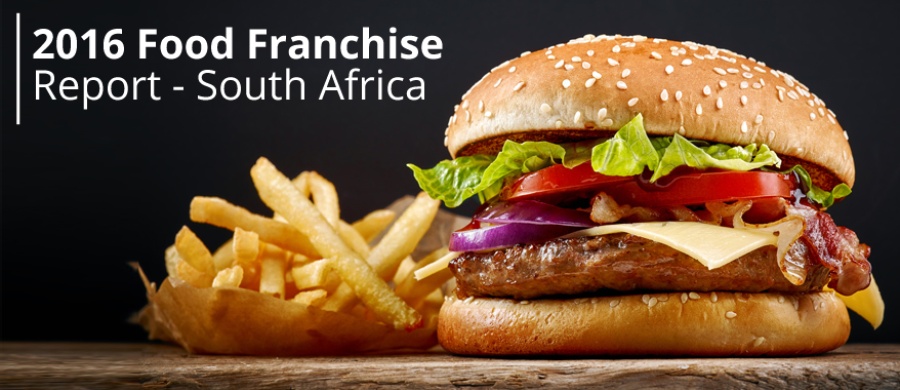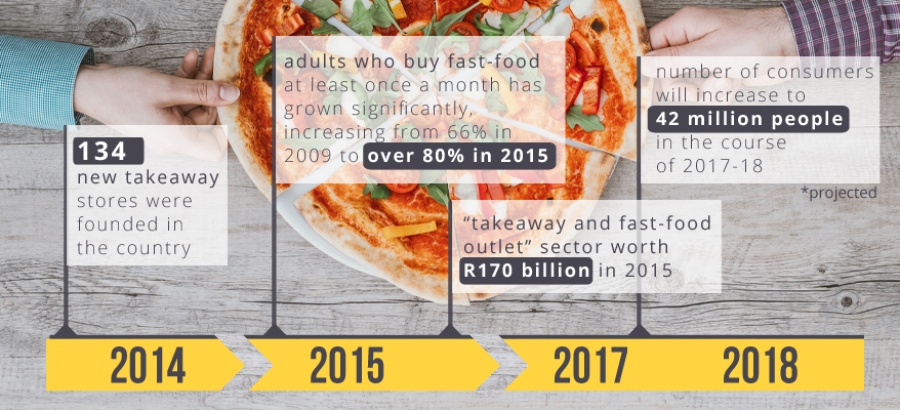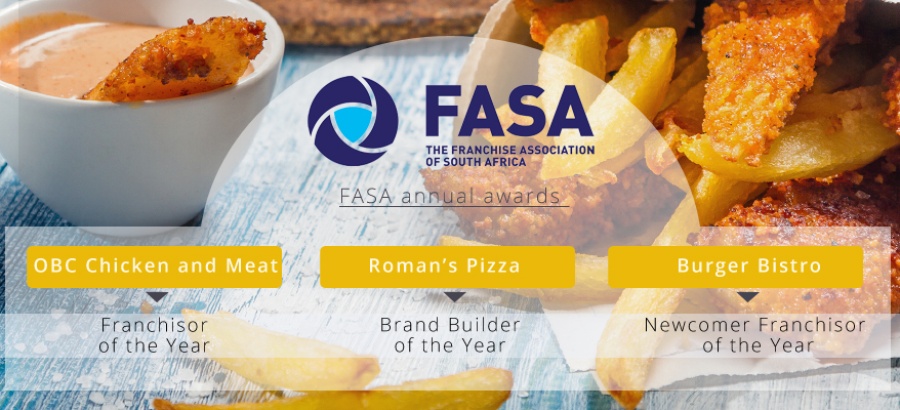
Of all of the various industries and economic sectors that have adopted the franchising model, it is easily most popular among food companies of various types, whether upmarket restaurant chains or fast-casual and quick-service restaurants (QSRs). The latter were among the first companies to adopt the franchising business model, and remain industry leaders: of the top ten franchises in Africa, all but one are in the food industry. The food industry has demonstrated over the years to be a resilient and reliable one, and which constantly adapts equally well to changing industry trends and societal mores. Below, we shall discuss the state of the industry in South Africa, and what’s in store for the coming year.
South African food service industry

South Africa’s food service industry is in exceptionally good health as of the end of 2016. Insight Survey reported that the fast-food industry alone is worth R300 billion every year, while Statistics South Africa recorded income from the “takeaway and fast-food outlet” sector as R170 billion in 2015. The proportion of adults who buy fast-food at least once a month has grown significantly, increasing from 66% in 2009 to over 80% in 2015. A Euromonitor report estimates that the number of consumers in this sector will increase to 42 million people in the course of 2017-8; another report from the same organisation predicts that fast food in South Africa will witness a continuous yearly growth rate of 9% for the entire 2014-19 period. In 2014, 134 new takeaway stores were founded in the country, which figure is set to increase by 4% every year, according to Insight Survey. All of this indicates that the South African food service industry in general, and the fast-food industry in particular, is in robust shape as we enter 2017.
South African food franchises

As for food franchises in South Africa, well over 100 such companies are listed on the website of the Franchise Association of South Africa (FASA), while two food franchises are currently advertising with us on FranchiseDirect.co.za. In April of last year, FASA held their annual awards ceremony, in which many of the winners and finalists were in the food service industry. These awards included OBC Chicken and Meat for Franchisor of the Year, for the second year running; Roman’s Pizza for Brand Builder of the Year; and Burger Bistro for Newcomer Franchisor of the Year. All of these companies achieved a great deal of success in 2016. OBC Chicken and Meat experienced growth of almost 30% in the months prior to their award, and are currently operating over 60 franchises across the country. Roman’s Pizza are running an incredible 214 branches across the country, and have achieved substantial success in diversifying their menu to offer, among other options, halal-friendly pizzas. From its recent founding in 2012, Burger Bistro has since grown to 4 franchises employing 55 people, with an average yearly growth in turnover of 20%.
Other than these aforementioned companies, South Africa is proving a very successful market for foreign food service franchises as well: several international franchises have taken note of South Africa’s average retail growth rate of 3-5% over the past few years and have either invested in the area (as in the case of Domino’s Pizza, Starbucks and Pizza Hut) or are unveiling plans to do so. For example, after a successful rollout of Burger King franchises in 2013, in February, Grand Parade Investments announced plans to introduce Dunkin’ Donuts and Baskin-Robbins to South Africa as well. The top 10 fast food brands have more than 3,600 franchises across the country. So what can we anticipate for the South African food service industry over the course of this year? Below, we shall discuss some of the most prominent trends and events facing the industry in 2017.
00000181-7b5c-d6a8-a1e5-7b7d793f0000
Industry trends
Value for money
Middle-class incomes in South Africa have shrunk slightly in recent years, and many South Africans are beginning to feel the pinch. To this end, customers availing of QSRs and other outlets are looking to cheaper options. The Franchise Association of South Africa observed that “Cheap fast food has become the norm – with consumers wanting it and fast food brands all having to supply it. Whether it’s a burger at rock bottom price or a two for one offer, cheap fast food is here to stay.” Restaurants which offer cheaper options such as KFC are doing exceptionally good business in South Africa, with a recent article noting that “Instead of doing away with fast-food altogether, cash-strapped South Africans are searching for the fast-food brands that offer the best value.” Offering cheaper menu items allows restaurants to cater to a broad range of demographics, and is definitely sound advice for all restaurants to consider as we head into 2017.
Healthy eating and vegetables

One of the most interesting trends of the food service industry in the 2010s is the increased prominence of healthy options, not just in specialist health food shops, but also to an unprecedented degree in quick-service restaurants and “food-to-go” establishments (or takeaways). In South Africa, as in many other developed nations, the modern food consumer is nutritionally conscious and literate, and puts a great deal of thought into the nutritional content of the food they buy and how it will impact upon their health. Some new quick-service franchises are specialising in healthy food and offering an increasing number of vegetarian options, but even multinational fast-food franchises such as McDonald’s, Domino’s Pizza and Pizza Hut have recently taken steps to diversify their menus, decrease the salt or sugar content of their products, and other measures to promote healthier eating. On this topic, the Franchise Association of South Africa reports that “No longer just a side-dish, vegetables are taking centre stage with restaurants trending with popular items such as kale and fast food brands catering to the growing vegetarian palate.” This move towards healthier eating and nutritional awareness has been heavily promoted by the South African government via initiatives such as the National Nutrition Week, which was held last October, the theme of which was “Love your beans - eat dry beans, peas and lentils!”
Environmental friendliness and local sourcing
Hand in hand with the increased focus on healthy eating and vegetables among South African consumers is a growing concern about the environmental impact their buying choices have. Environmental concerns are visible in just about every South African industry, and the food service industry is no exception to this rule. Major food franchises such as Subway have made major efforts to decrease their environmental footprint, such as by switching to recyclable packaging or environmentally-friendly ingredients, oil and cleaning supplies. A major way South African consumers are contributing to the environment is by showing an increased preference for locally-sourced foods, both due to their health value and due to the reduced carbon emissions associated with transporting them. A market for organic produce has long been visible in South Africa, both in supermarkets and in weekend markets. The Franchise Association of South Africa observes: “Continuing the holistic and healthy food trend, more and more restaurants and fast foods are going the purist route – with organic and preservative free ingredients and ethical farming practices that ensure cage-free and antibiotic-free practices.” Taking account of this, many large franchises such as McDonald’s and Burger King have already begun to advertise that their beef is locally sourced. Environmental awareness and locally sourced food look certain to be two trends which are here to stay as far as the South African food service market goes, so food service franchises would do well to take account of these in planning their businesses and advertising.
Outlook
In this competitive market, it’s important for franchises to be open to change, to evolve and keep up with the trends. South African consumers are focusing heavily on the nutritional value of their food, where it comes from and how it is prepared, so it is important for those in the food business to be conscious of these issues as well if they want to succeed. South African consumers want convenience, but not at the expense of quality. Food service franchises will have to find innovative ways to combine convenience, low price and healthy, quality food to attract their customers.
For more information on food franchises, see our food franchise opportunities page.














